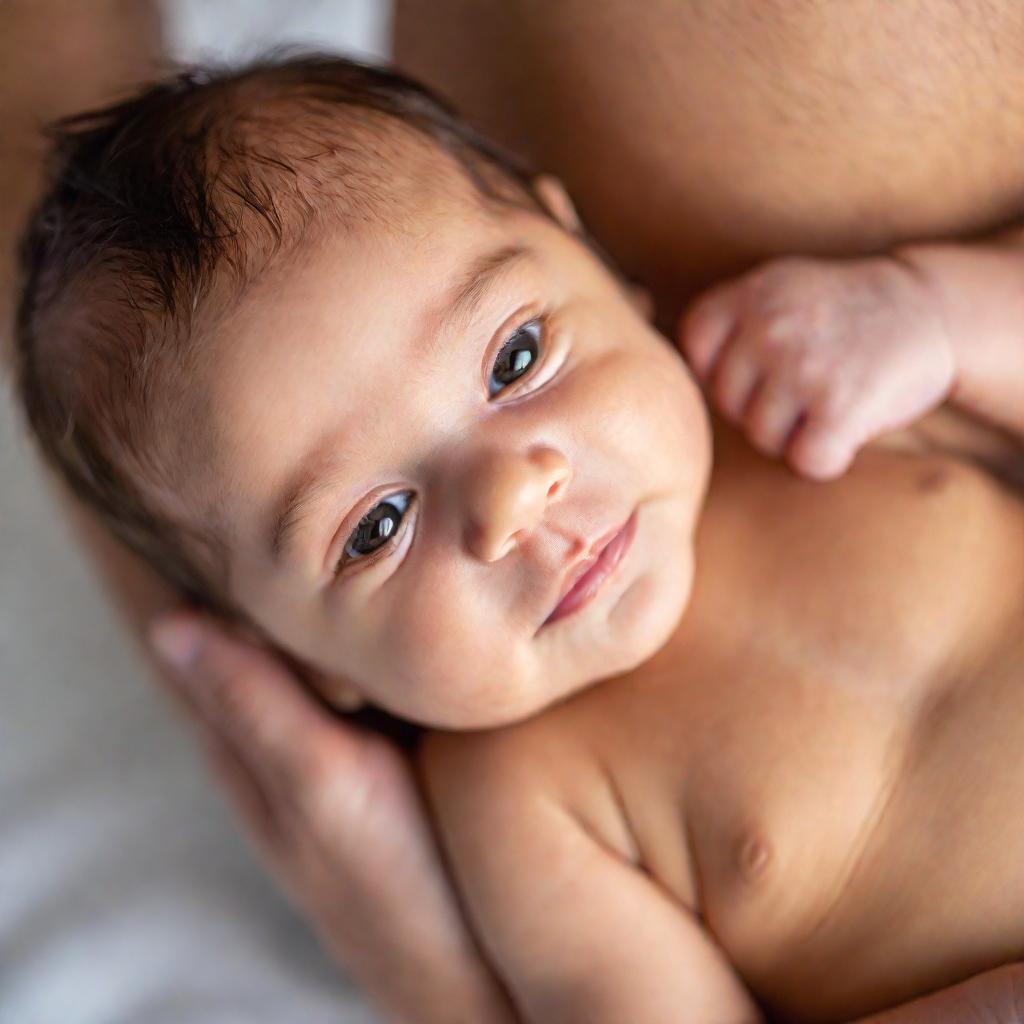Baby acne, often referred to as neonatal acne, is a common and typically harmless skin condition that many newborns experience. It usually appears as tiny red or white bumps on a baby's face and can also show up on the back, neck, and sometimes the chest. Understandably, seeing these spots on your precious little one can cause concern, but rest assured, baby acne is not only benign but also temporary.
The causes of baby acne are not entirely understood, but several factors might contribute to its development. One leading theory suggests that the lingering effects of maternal hormones – hormones that crossed the placenta during pregnancy – temporarily linger in the baby’s bloodstream, possibly stimulating the baby's sebaceous (oil) glands. These hormones, though essential during pregnancy, continue to make their presence felt in the first few weeks after birth, sometimes resulting in these minor skin disturbances.
Another plausible factor could be the rapid development and adaptation of the newborn's sensitive skin to the outside world. This transition period can sometimes lead to mild skin reactions, such as acne, as your baby’s skin learns to regulate itself and respond to new environmental factors.
For many new parents, understanding how widespread baby acne is might provide some comfort. Statistics suggest that approximately 20% of newborns are affected by this condition. Though it might seem like a lot, these numbers reassure us that baby acne is a normal part of many infants' early weeks. Usually appearing within the first few weeks to a couple of months after birth, this condition often resolves on its own within a span of weeks to months, without the need for medical treatment.
While navigating the early days of parenthood, these skin changes can seem like another hurdle in your ever-growing list of new things to monitor. However, by gently caring for your baby's skin and allowing time to pass, you’ll notice that these little imperfections fade away. In the meantime, continuing to learn and understand more about your baby's health allows you to grow more confident in your role as a parent, knowing that together you and your little one are both adapting beautifully to this new journey.
Baby acne, with its characteristic clusters of red or white bumps, often presents itself prominently on your infant's cheeks, nose, and forehead. These small bumps may vary in size and intensity, appearing sporadically across the face like a sprinkling of tiny tales. While this may look concerning, it's a common sight among new parents, serving as a gentle reminder that your baby's skin is in its earliest stages of learning and growth.
Most parents notice these tiny spots making their debut when their newborn is around three to four weeks old. This timing coincides with the myriad of growth changes that occur as a baby adjusts to life outside the womb. These bumps often peak in intensity during this period but are likely to naturally fade away by the time your baby is between four to six months old, marking yet another milestone in their early development journey.
- Red Bumps: These typically appear on the cheeks and are similar in texture and appearance to what we, as adults, might call pimples.
- White Bumps: Known as milia, these are small whiteheads that often cluster around the nose and cheeks, and occasionally on the forehead.
- Blotchy Patches: Sometimes, the skin around the bumps can appear red and irritated, but this is just the skin responding to the new world around it.
Access to visual references can be a reassuring touchpoint for many new parents navigating this phase. Comparing what's on your child's skin to medical-grade photographs can help affirm that these spots are indeed just baby acne and not something to worry over. However, it's important to acknowledge that all babies are unique, and variations are completely normal.
During this time, simply understanding what to expect can be an immense comfort. Witnessing your baby’s skin smoothing out over the months as the acne subsides is a gentle reminder of the progressive journey they are on. Just as these little imperfections come and go, so too will any anxieties they bring, settling quietly as you continue to nurture your child through their remarkable early moments.
By embracing the natural progression of your baby's skin, you engage with your role as a caregiver in empowering ways. Witnessing their growth phase by phase, you become attuned not only to the visible signs of change but to their underlying health and well-being, reminding yourself that you are perfectly equipped to guide them through every small, tender step.
As you navigate the journey of parenthood, it’s natural to encounter various myths surrounding baby acne. Some common misconceptions suggest that baby acne is a result of dirty skin or allergies. Rest assured, neither is true. Baby acne is not caused by uncleanliness. In fact, your baby's delicate skin is likely already receiving sufficient care from your gentle touch. Allergies, too, are not to blame in this case; baby acne does not result from allergic reactions. These myths can often add unnecessary worry, but knowing the truth helps lighten the load.
Understanding the science behind baby acne offers deeper peace of mind. Evidence suggests that maternal hormones play a significant role in the skin changes observed in newborns. These hormones, naturally present and highly beneficial during pregnancy, take some time to leave the baby's system. Their lingering effects can stimulate oil glands, leading to those small red and white bumps commonly associated with baby acne. The sensitivity of a newborn’s skin further contributes to these temporary changes as they adapt to their new environment outside the womb.
Though baby acne is generally harmless, it's essential to recognize when to seek further guidance. If at any point you feel concerned about the severity or persistence of the acne, consulting with a pediatrician can provide valuable reassurance and advice. A healthcare professional can differentiate baby acne from other skin conditions and ensure that your baby is healthy and thriving. Doing so not only addresses your concerns but also fortifies your understanding, allowing you to continue caring for your little one with confidence.
In these early stages, the key is trusting your instincts and nurturing the bond with your baby. As you tend to their every need, observe the gradual journey their skin takes—from the first touch to the gentle fading of those initial skin disturbances. Each step you take in learning more about baby acne and supporting your child’s wellbeing contributes to a nurturing environment where both you and your baby can flourish. Let this knowledge and understanding shape your parenting journey, guiding you with clarity and self-assurance as you witness the continuous growth and change that define these precious early months.
The well-being of your baby is of utmost importance, and caring for their skin gently is an integral part of nurturing them. When addressing baby acne, understanding the right skincare approach can ease both your concerns and your baby's experience. One of the gentlest ways to care for your newborn's skin is by washing their face with lukewarm water and a mild, fragrance-free baby soap. Doing this once a day can help maintain cleanliness without over-stimulating their sensitive skin. It's a straightforward practice that fits seamlessly into your daily routine while ensuring your baby's comfort.
When dealing with these delicate skin changes, it's crucial to avoid the temptation of using harsh treatments, creams, or over-the-counter acne medications intended for older children or adults. These products can be too strong for your baby's tender skin, potentially causing irritation or making the situation worse. Instead, focus on keeping it simple, prioritizing products formulated specifically for infants. Your gentle touch, paired with appropriately chosen products, offers the best care during this phase.
Patience is an essential companion during this period. While it can be emotionally challenging to see blemishes on your baby's pure skin, remember that baby acne is a self-resolving condition. Trust in the natural process, knowing that, in due time, those tiny bumps will fade away as your baby continues to grow and thrive. Offering reassurance to both yourself and your infant, you'll find comfort in the knowledge that this is a normal part of many newborns' development, often disappearing without intervention.
Keep in mind, as you navigate these early months, that each experience adds to the rich tapestry of your parenting journey. Every little revelation about caring for your baby, such as learning to distinguish different skin conditions, enhances your confidence. With patience and gentle care, you will see your child blossom, with each day bringing new discoveries and joys.
As these days unfold, you'll find moments to cherish in the nuanced learning of your baby's needs and the satisfaction in watching them flourish under your attentive care. The journey of parenthood is filled with unique milestones, each offering its own challenges and rewards. Embrace them with the reassurance that your instincts, coupled with informed guidance, are leading the way towards your family’s vibrant future.
As you continue to nurture your baby through these tender early months, it’s important to remain aware of specific signs that may require closer attention from a healthcare provider. While baby acne is usually harmless and temporary, certain symptoms should prompt a visit to the pediatrician. Observe your baby’s skin closely for severe inflammation, or if you notice that the acne is spreading beyond the usual areas such as the face, neck, or back. Additionally, if these skin blemishes persist significantly beyond the typical timeline, it may be time to seek medical advice.
Consulting with a pediatrician can bring peace of mind and clarity to your understanding of your baby’s skin condition. The expertise they provide can help rule out other conditions that might mimic or exacerbate the appearance of acne, such as eczema or bacterial skin infections. These conditions often require different management strategies, and a trained professional can guide you in distinguishing between them, ensuring your baby receives the most appropriate care.
As you navigate these new experiences, it’s also essential to rely on established medical sources and guidelines when considering any kind of treatment for your baby's skin. The internet offers a vast array of information, but not all of it is suited to the delicate needs of a newborn. Peer-reviewed studies, reputable medical organizations, and advice from certified healthcare providers form a solid foundation for informed decision-making. This evidence-based approach guarantees that you are providing the safest and most effective care for your child’s tender skin.
Remember, your instincts as a parent are powerful. Coupled with guidance from healthcare professionals, they form a robust strategy for nurturing your baby’s well-being. These early months, with their unique blend of anticipation and learning, are a special time of bonding and growth for both you and your little one. As each day unfolds, acknowledging every tiny change and adaptation with patience and love fosters an environment where your baby can thrive.
The journey of parenting is intricately woven with moments of discovery and dedication, offering personal insights and a deeper connection with your child. Embrace these experiences, knowing you are equipped with the knowledge and compassion needed to support your baby confidently, nurturing their health and happiness each precious step of the way.
Recognizing that baby acne is a common and benign skin condition can bring significant comfort to new parents. Understanding that it affects a substantial number of newborns can alleviate some of the worry that might accompany these early observations. It's vital to remember that baby acne doesn’t indicate any underlying health issue; rather, it is a normal developmental stage that many infants naturally outgrow. This awareness can help assure you that these small bumps are simply part of your baby’s early growth journey.
It’s important for parents to feel supported and encouraged to share their concerns, whether they're about baby acne or any other aspect of their newborn’s well-being. Engaging in open dialogues with caregivers and healthcare professionals can provide reassurance and clarity, enhancing your confidence in managing these minor setbacks. Sometimes, just articulating your worries and hearing an experienced voice can transform anxiety into calm understanding.
Navigating the early stages of parenting is often less daunting when you lean on support networks, both in-person and online. Consider exploring online forums or parent groups where new and experienced parents alike share their journeys and offer encouragement. These communities can be a sanctuary of empathy and shared wisdom, where you can find solace and advice from others who have walked in your shoes.
Connecting with others who understand your experiences can provide emotional support, offering a space to exchange tips, share stories, and find communal reassurance. These interactions can help normalize the ups and downs of early parenthood, reinforcing the knowledge that you’re not alone on this path. Choosing to engage with these supportive networks can enrich your experience, providing a broader perspective on the challenges and joys of caring for your newborn.
Through understanding, reassurance, and the support of your community, you can approach your parenting journey with increased confidence. Embracing both the challenges and the delightful moments, while leaning on reliable sources and heartfelt connections, enables you to nurture not just your baby, but also the bond you share. With every step, you’re fostering a loving environment where both you and your baby can thrive together.
Creating a calm and nurturing environment is not only beneficial for addressing baby skin issues but also essential for promoting overall well-being for you and your newborn. Ensuring a tranquil atmosphere can help reduce any stress-related skin reactions and contribute to a positive, soothing start for both you and your baby. By prioritizing peaceful moments, like softly singing or gently rocking your baby, you foster a sense of security and warmth, essential for their emotional and physical development.
- Set a Routine: Establish a gentle skincare routine that aligns with your baby's natural rhythms. This provides stability and predictability, allowing you both to relax into the flow of everyday life, knowing each step is part of a caring ritual.
- Mindful Touch: Gentle, mindful touch while bathing or moisturizing provides comfort and strengthens your bond with your baby. This nurturing interaction is soothing for your baby and can help ease any transient skin issues.
- Environment Matters: A calm, clean environment helps minimize potential irritants. Regularly airing out the nursery, using hypoallergenic laundry detergent, and maintaining a moderate room temperature can also support sensitive baby skin.
While these early weeks can sometimes feel overwhelming, remember that many of the challenges you face are temporary. Baby acne and similar skin conditions often resolve naturally as your newborn continues to grow and adapt to their new world. Amidst these changes, every smile and milestone you witness reaffirms the joy and wonder of this precious time.
Reveling in the swift passage of these early days, you become a part of a beautifully evolving story, one where each tiny triumph adds color and vibrance. Watching your baby's curiosity unfold as they explore their environment, their happiness illuminating each moment with warmth and light, is a testament to your loving care.
In this journey, trust your instincts and let your innate nurturing qualities guide you through the complexities of early parenthood. Your ability to navigate this path, equipped with love and growing wisdom, is profound. Welcoming each twist and turn with patience allows you to confidently support your baby's health and happiness, strengthening that cherished bond you both share.


















